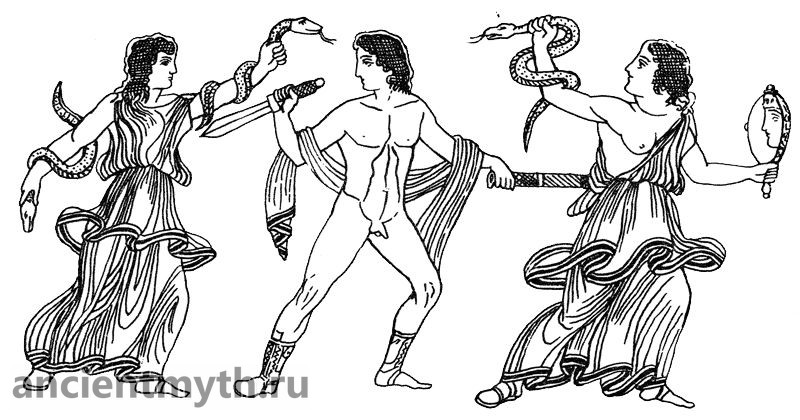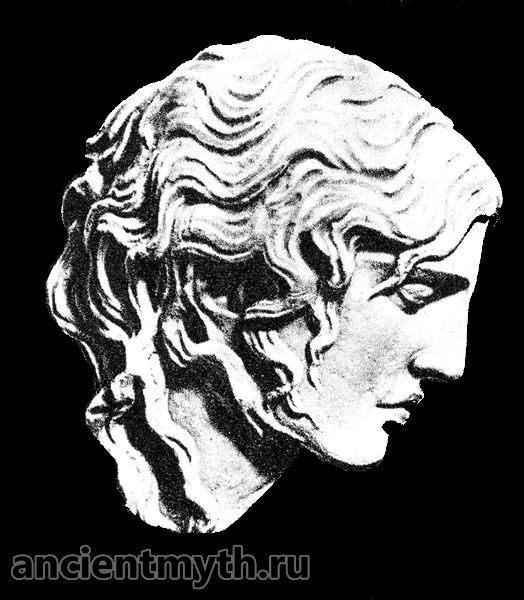Apollo and Pallas Athena rescue Orestes from the persecution of Erinias
Persecuted by the vengeful Eriniyami, exhausted by wandering and grief, finally came Orestes went to the sacred Delphi and sat there in the temple

(Drawing on a vase.)
Even the terrible goddesses followed him to the temple of Apollo, but there the god of arrows put them to sleep, and their terrible eyes closed with sleep.
Apollo secretly appeared to Orestes from Erinias and ordered him to go to Athens and there to pray for protection from the ancient image of the goddess Athens-Pallas. God promised his help to the unfortunate Orestes, and gave him his brother as a guide, god Hermes. Orestes got up, quietly left the temple and went with Hermes to Athens.
He had just left when a shadow rose from the ground in the temple of Apollo Clytemnestra. When she saw the sleeping Erinias, she began to wake them up and reproach them for ceasing to pursue the murderer who shed his mother's blood. She hurried them to chase the hidden Orestes as soon as possible and not give him a moment's peace. But the Erinii slept soundly, heavily, and in their sleep they moaned, sometimes screaming, as if chasing a murderer fleeing from them. Finally, with great difficulty, one of the Erinias woke up and woke the others. The Erinii were enraged when they saw that Orestes had disappeared. They began to reproach Apollo for snatching the murderer from their hands, but Apollo, threatening with a bow, drove them out of his temple. Full of furious anger, the goddesses rushed in a discordant crowd in the footsteps of Orestes.
Meanwhile, Orestes came to Athens and there sat down by the statue of the goddess Athena, embracing her with his arms. Soon the Erinias were brought. They were looking everywhere for Orestes. In terrible anger, the goddesses of vengeance were ready to tear apart the unfortunate, but they did not dare to offend the sacred image of Athena.

(Bas-relief of the III century BC)
Athena heeded the pleas of Orestes. To solve his case, she chose a court from the Athenian elders. This court - areopagus - from now on always had to exist in Athens and gather at the hill where the Amazons once camped when they attacked Theseus. This hill has since been called the hill Ares, since Amazons were sacrificed to him.
The judges elected by Athena gathered, two urns were brought in, into which the judges had to put stones during the voting, and the trial began. The goddess Athena also participated in it as a judge. People were crowding around, wanting to hear how the judges would decide the case. The Erinii accused Orestes and menacingly demanded that he be convicted. The god Apollo himself appeared to protect Orestes. Apollo calmly began to speak in defense of Orestes. He justified his act, since Orestes was taking revenge on Clytemnestra for a terrible crime - the murder of her husband, the great hero of King Agamemnon. Yes, finally, Orestes fulfilled his will. We listened to the accusers and the judge's defender and started voting.It was decided that if the same number of votes were cast for the accusation and acquittal of Orestes, then he would be acquitted. When the judges' votes were counted, there was an equal number of acquittal and accusatory votes. The same number of votes for the accusation and acquittal turned out to be because Athena voted for Orestes, saying that she voted for him, since she did not have a mother, but only a father, god Zeus. Thus, Orestes was acquitted, and the Erinii had to stop their persecution.
The Erinii became terribly angry - the court deprived them of their ancestral rights to punish criminals with terrible torments. They threatened Erinia that they would devastate the whole of Attica and plunge it into a sea of disasters. But Athena softened the anger of the goddesses; she persuaded them to stay forever in Attica in a sacred cave, where all Athenians would pay them great honors.The formidable goddesses agreed. With great triumph, the citizens took them, led by Athena and her priests, to their sanctuary - a cave at the foot of Ares Hill. Since then, the Erinias have become defenders of the whole Attica, and they have been called Eumenides.